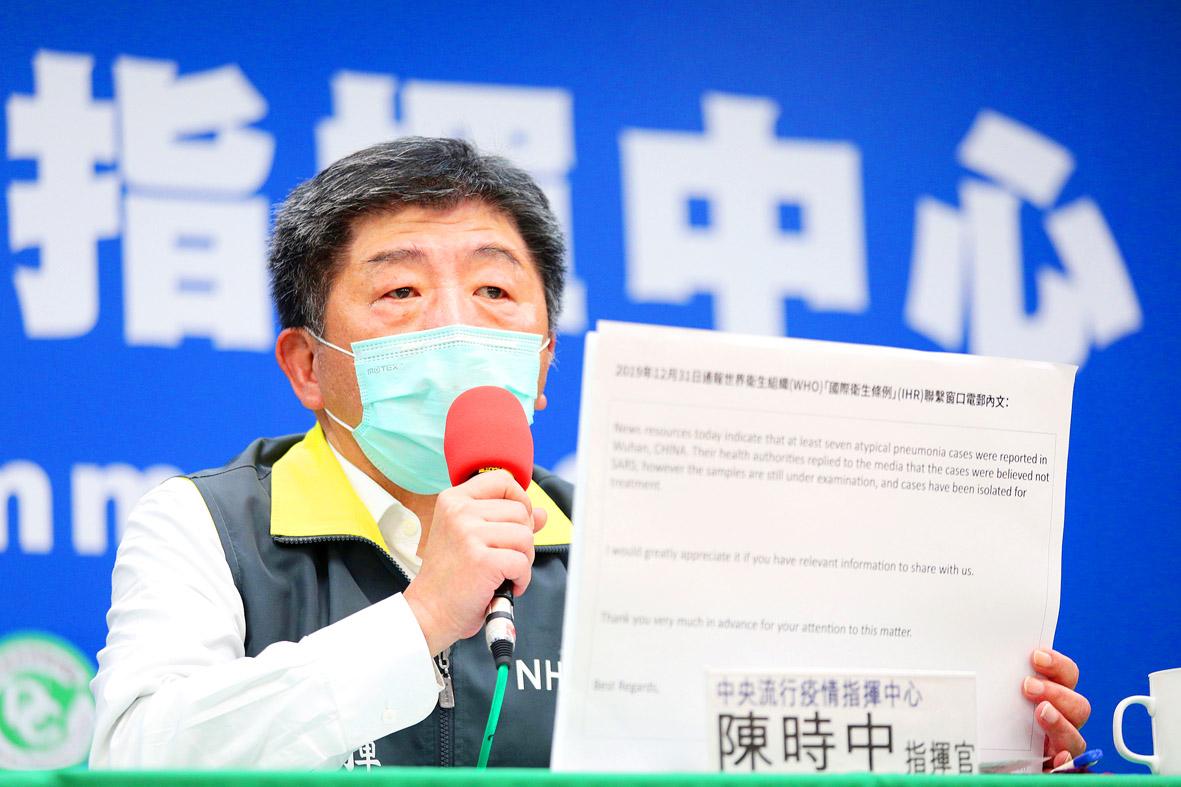Minister of Health and Welfare Chen Shih-chung (陳時中) yesterday urged the WHO to be honest as the Central Epidemic Command Center (CECC) published the e-mail it had sent to the world body in December last year alerting it about the risk of an outbreak in China.
The WHO on Friday said it received an e-mail from the Ministry of Health and Welfare on Dec. 31 last year, but added that “there was no mention in the message of human-to-human transmission.”
During a news conference at the CECC in Taipei yesterday, Chen read out the Centers for Disease Control’s (CDC) e-mail to the WHO International Health Regulations (IHR) Focal Point on Dec. 31 last year.

Photo: CNA
“News resources today indicate that at least seven atypical pneumonia cases were reported in Wuhan, China,” the e-mail read. “Their health authorities replied to the media that the cases were believed not SARS; however, the samples are still under examination, and cases have been isolated for treatment.”
“I would greatly appreciate it if you have relevant information to share with us. Thank you very much in advance for your attention to this matter,” it added.
China commonly uses the term “atypical pneumonia” to refer to SARS, but Chinese authorities had been ambiguous in describing the novel coronavirus as “an atypical pneumonia, but not SARS.”
“The e-mail specifically noted that patients had been isolated for treatment,” Chen said. “Any public health expert or medical professional would know what circumstances would require patients to be isolated for treatment.”
As there were no confirmed cases in Taiwan at the time, the CDC could not definitively state that there had been human-to-human transmission of the disease, he added.
“We would really be giving a misleading message if we firmly stated that there was human-to-human transmission, so we clearly alerted the IHR about the information we received,” he said.
“If our warning to the WHO that the patients were ‘isolated for treatment’ does not count as a warning, than what does?” Chen said.
“While Taiwan, a non-member state, has informed the WHO, I would like to ask whether China, a WHO member, had informed the WHO about the situation?” Chen said, adding that if China did not alert the WHO at the time, then it had been concealing the truth about COVID-19, and if China did alert the WHO, then the WHO has neglected its duty in warning the world.
Chen urged the WHO to be honest in dealing with the issue and stop trying to shift the focus.
The CECC in a news release said that the IHR Focal Point only responded with a short message stating that Taiwan’s information had been forwarded to experts.
Taiwan strongly suspected that human-to-human transmission was already occurring at the time, but could not confirm it, so enhanced border control and quarantine measures were implemented based on the assumption, including screening passengers on flights from Wuhan prior to disembarkation starting on Dec. 31 last year, the release said.
The CDC also sent experts to Wuhan in January to gain a better understanding of the outbreak, patients’ exposure history and the control measures taken there, it added.

CHAOS: Iranians took to the streets playing celebratory music after reports of Khamenei’s death on Saturday, while mourners also gathered in Tehran yesterday Iranian Supreme Leader Ayatollah Ali Khamenei was killed in a major attack on Iran launched by Israel and the US, throwing the future of the Islamic republic into doubt and raising the risk of regional instability. Iranian state television and the state-run IRNA news agency announced the 86-year-old’s death early yesterday. US President Donald Trump said it gave Iranians their “greatest chance” to “take back” their country. The announcements came after a joint US and Israeli aerial bombardment that targeted Iranian military and governmental sites. Trump said the “heavy and pinpoint bombing” would continue through the week or as long

TRUST: The KMT said it respected the US’ timing and considerations, and hoped it would continue to honor its commitments to helping Taiwan bolster its defenses and deterrence US President Donald Trump is delaying a multibillion-dollar arms sale to Taiwan to ensure his visit to Beijing is successful, a New York Times report said. The weapons sales package has stalled in the US Department of State, the report said, citing US officials it did not identify. The White House has told agencies not to push forward ahead of Trump’s meeting with Chinese President Xi Jinping (習近平), it said. The two last month held a phone call to discuss trade and geopolitical flashpoints ahead of the summit. Xi raised the Taiwan issue and urged the US to handle arms sales to

State-run CPC Corp, Taiwan (CPC, 台灣中油) yesterday said that it had confirmed on Saturday night with its liquefied natural gas (LNG) and crude oil suppliers that shipments are proceeding as scheduled and that domestic supplies remain unaffected. The CPC yesterday announced the gasoline and diesel prices will rise by NT$0.2 and NT$0.4 per liter, respectively, starting Monday, citing Middle East tensions and blizzards in the eastern United States. CPC also iterated it has been reducing the proportion of crude oil imports from the Middle East and diversifying its supply sources in the past few years in response to geopolitical risks, expanding

Pro-democracy media tycoon Jimmy Lai’s (黎智英) fraud conviction and prison sentence were yesterday overturned by a Hong Kong court, in a surprise legal decision that comes soon after Lai was jailed for 20 years on a separate national security charge. Judges Jeremy Poon (潘兆初), Anthea Pang (彭寶琴) and Derek Pang (彭偉昌) said in the judgement that they allowed the appeal from Lai, and another defendant in the case, to proceed, as a lower court judge had “erred.” “The Court of Appeal gave them leave to appeal against their conviction, allowed their appeals, quashed the convictions and set aside the sentences,” the judges